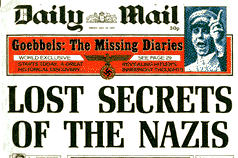ON July 5, 1992 The Sunday Times, London's most prestigious weekend broadsheet, revealed that it had bought from David Irving the key passages of the missing Goebbels Diaries which he had brought back from Moscow the day before. There was outrage from the Jewish community, for many reasons (caused not least by editor Andrew Neil's bovine publicity campaign). A three-week cacophony by these bodies began, designed to pressure the newspaper to violate its contract with Mr Irving and not pay him the substantial sums due -- they buckled, he fought them in the High Court for breach of contract, but that is another story. On July 12, 1992, the day the serialisation of the diaries began, The Sunday Times published an editorial and two articles backing Mr Irving -- one by a rabbi, and one by Barbara Amiel, a forceful journalist who had married Canadian newspaper tycoon Conrad Black, monied proprietor of (among others) The Daily Telegraph and The Spectator. Miss Amiel's job was to make Mr Irving "salonfähig", not a task for which her fellow-Jews would award her many Brownie points. She tackled it with gusto. |
 July 12, 1992, Page 2/4 FEATURES
When a Jew can trust David Irving by Barbara Amiel
This is one of many telephone calls I received last week: "Hello, Barbara. I know that you must be facing a real moral crisis about the Sunday Times's use of Irving. What are you going to do?" When my Jewish Chronicle arrived last Friday, a measured editorial told me that my employer's use of Irving was "an insult to the Jews" and its headline story quoted Judge Israel Finestein of the British Board of Deputies expressing "astonishment". This is my view. I understand why Jews are having a fit over the use of Irving believe me, I understand but I have no patience with it. My argument, of course, proceeds on the basis of what my newspaper has represented to me in answer to my questions, and I assume what they tell me is true because (a) I don't know anything to the contrary and (b) none of the critics of The Sunday Times has claimed anything to the contrary.
The Institute of Contemporary History in Munich actually discovered the complete diaries there a few months ago and had negotiated for the rights. But before they had a chance to microfilm the glass plates on which the diaries are engraved, Irving talked his way in with the aid of The Sunday Times and scooped them. In retaliation, the Munich institute passed the Daily Mail some unpublished extracts from pages of Goebbels's diaries it got in 1990 from East Germany. The problem with the use of Irving, for me, was simple. Irving is one of those infuriating people who researches everything and draws utterly wrong conclusions. Only Irving would read every single memo between the German secret police and the Gestapo and truly know that they contain no reference to Hitler's order to eliminate the Jews. But he cannot see that this is beside the point: the Holocaust happened whether or not it exists in memos and whether or not Irving believes there were gas chambers.
Why use a man of whom we can never be 100% sure? Well, the project was his, alas. It did not come to The Sunday Times from Joachim Fest or Gordon Craig, alas. Furthermore, I think there is a fundamental principle here. David Irving has a skill as an archivist of the Third Reich that has been recognised by historians from Lord Dacre to Peter Pulzer. Are we now to boycott the use of people in their areas of expertise because we disapprove of their political views? It is as easy for experts to go nutty as it is for any other human being, but this may not impair their special abilities. When Howard Hughes went mad he did not stop being a fine pilot and businessman. I watched Glen Gould in a New York recording studio practising with gloves on, but that did not prevent him from being the finest Bach pianist. I would not hire Hitler to paint my house if there were other housepainters around, but if Hitler had simply written Mein Kampf and was an anti-semite, I would not ban him as a housepainter.
Is that wrong? No. Is it a moral outrage? No, provided all safeguards are in place to see that Irving is only a technician and that his role is clearly explained to the readers and that responsible historians annotate, check and interpret the diary selections. Does it give credibility to Irving and help resurrect Nazism in the world? I don't think so. What has helped Nazism in the world apart from the deep seated anti-semitism that exists perennially together with the deep attraction totalitarianism has for some people (such as Irving) has been the extraordinary guilt we have placed on Germany since the first world war. The punitive provisions of the Versailles treaty and the assignment of moral guilt on all Germans for the Kaiser's war certainly helped the Nazis. Was the use of Irving vulgar? Yes. And if you want to create a stink you must wallow in it along with the attention it brings. Finally, the question is: are the self-serving diaries of Goebbels worth all this? Goebbels, after all, invented the modern notion of propaganda and the Big Lie. But, like many people, I am interested in what goes on in the minds of totalitarians and, self-serving though his prose may be, it is possible that Goebbels will be revealing in a manner he would never have understood. I wish there had been another way than using Irving.
Paying such a man creates a very emotive reaction in me. But
going nuts over it is as nutty as David Irving himself.
|

 FIRST
let me say how silly I feel in starting a column this way.
But, when writing about anything to do with Nazis, one can't
be too careful. Thus: I am a Jew. My father fought the Nazis
with distinction in the British Eighth Army. I know only too
well that the Holocaust took place and count its victims and
first-hand survivors among my former in-laws and dearest
friends. I am convinced in my own mind that David
Irving, the revisionist historian, is a nutcase.
FIRST
let me say how silly I feel in starting a column this way.
But, when writing about anything to do with Nazis, one can't
be too careful. Thus: I am a Jew. My father fought the Nazis
with distinction in the British Eighth Army. I know only too
well that the Holocaust took place and count its victims and
first-hand survivors among my former in-laws and dearest
friends. I am convinced in my own mind that David
Irving, the revisionist historian, is a nutcase. David
Irving found out that the complete microplates of the
David
Irving found out that the complete microplates of the
 The
bodies of Jews piled like cordwood on handcarts in Warsaw,
Budapest and Cracow were seen, recorded, and is the
Holocaust and cannot be denied. Irving has conceded that two
million Jews were liquidated, but he blames Hitler's
subordinates and uses historical material selectively to
exonerate the Fuhrer. How can one trust the judgment of such
a person in the Goebbels project? One does it by making sure
that his judgment is not used. Irving photopied all material
he transcribed, which could then be checked. He has not been
allowed to interpret or comment on the material. This
reduces his role to a purely mechanical one. How can we be
sure he did not ignore material inconvenient to his apologia
for Hitler? I suppose we can never be 100% sure, but he was
accompanied in the archives at all times by a German and
Russian speaking "minder" from The Sunday Times.
Irving was also given detailed instructions by the paper of
what to get from the diaries.
The
bodies of Jews piled like cordwood on handcarts in Warsaw,
Budapest and Cracow were seen, recorded, and is the
Holocaust and cannot be denied. Irving has conceded that two
million Jews were liquidated, but he blames Hitler's
subordinates and uses historical material selectively to
exonerate the Fuhrer. How can one trust the judgment of such
a person in the Goebbels project? One does it by making sure
that his judgment is not used. Irving photopied all material
he transcribed, which could then be checked. He has not been
allowed to interpret or comment on the material. This
reduces his role to a purely mechanical one. How can we be
sure he did not ignore material inconvenient to his apologia
for Hitler? I suppose we can never be 100% sure, but he was
accompanied in the archives at all times by a German and
Russian speaking "minder" from The Sunday Times.
Irving was also given detailed instructions by the paper of
what to get from the diaries. Were
there other historians around who could have done the job?
Apparently the writing of Goebbels is difficult to read
(this is confirmed in the preface to Hugh
Trevor-Roper's The Goebbels Diaries) and The Sunday
Times could not find anyone else. This is one area where I
think The Sunday Times may be a little disingenuous.
David Irving was bound to attract controversy. I'm not sure
how many people would have flocked to read the Goebbels
diaries if they had simply been attached to a sombre
historian. Newspapers are in circulation wars and I can't
help thinking The Sunday Times would not run from the
exposure Irving brings.
Were
there other historians around who could have done the job?
Apparently the writing of Goebbels is difficult to read
(this is confirmed in the preface to Hugh
Trevor-Roper's The Goebbels Diaries) and The Sunday
Times could not find anyone else. This is one area where I
think The Sunday Times may be a little disingenuous.
David Irving was bound to attract controversy. I'm not sure
how many people would have flocked to read the Goebbels
diaries if they had simply been attached to a sombre
historian. Newspapers are in circulation wars and I can't
help thinking The Sunday Times would not run from the
exposure Irving brings.